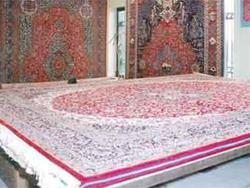Handmade Persian Rugs Getting Competition
Tehran, Iran, March 25, 2008--Selling handmade Persian carpets used to be brisk business in Iran, but the trade now faces uncertainty amid growing automated competition at home and abroad.
Weaving the carpets has been a way of life for many Iranian families, who have passed the tradition down from one generation to the next.
"We have both old and new carpets and we produce new carpets in Tabriz. We renovate and repair old carpets and produce new carpets out of their old designs," said vendor Dariush Nasiri.
Persian carpets are a major industry for Iran. They make up around 12 percent of the country's non-oil exports.
But now the business is facing problems—growing competition at home, and abroad.
Inside Iran, modern factories are churning out low-cost, machine-made carpets, displacing expensive hand-woven rugs.
"We must keep up with the times and stay up to date. Only machines give us this speed this possibility," said one seller.
Meanwhile, outside Iran, customers are buying more hand-made carpets made in other countries.
Analysts suggest Iran is giving up its market share because some hand-made Persian carpets are losing their quality as synthetic material is used.
The effects of this competition are being felt by the makers of handmade carpets across Iran such in Tabriz, where hand-making carpets has been a major industry for centuries.
Many carpets sold in the Tabriz bazaar come from the nearby countryside, where families like the Bairamzadehs work hours on end for months to create a single piece of art.
When Mohammad, his wife, and five kids finish, a scene of hunters and animals will appear on their product.
The family says these days, selling their carpets has become much tougher.
"In the old days, we used to export our carpets and foreigners used to come here to buy them, but it's no longer like that. The bazaar grew weak. Our work has hit a dead-end," said Afruz Rezai, who weaves his carpet by hand.
But Mohammad says despite competition from other handmades abroad and machine-mades at home, anyone who buys his carpets will not be sorry.
"We have confidence in our carpets because we made them ourselves. The life and durability of handmade carpets is longer. Machine-made carpets wear out sooner."
A hand-made Persian carpet could cost at least US$3,500.
But American consumers can spend as little as a few hundred dollars at a discount store for something that looks similar, even if the quality does not compare.
So Iranian carpet makers may have to create a new strategy to weave a little more soul into the rug business.
